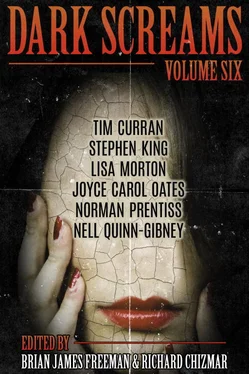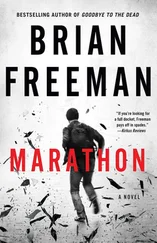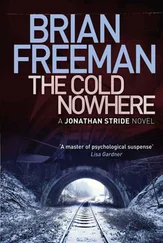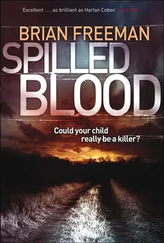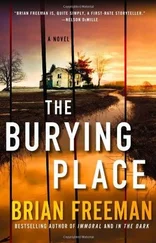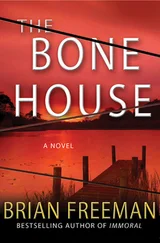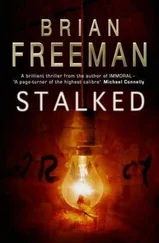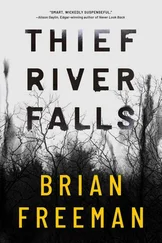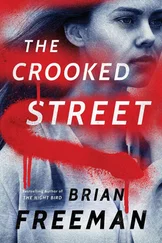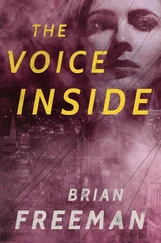Clow stood behind an old man in a soft mulberry coat the color of ripe plums. The man held the hand of a little boy, making the child look at what was in those suspended cages.
“What did that one do?” the boy asked.
The old man paused with his snuffbox in hand. “Eh? That one? Nothing but a filthy grave robber.”
They moved on, but Clow just stood there, feeling sick and angry and terribly alone. There were some six others gibbeted, but Clow only saw Mickey, his old and dear friend.
The gibbet was no simple cage but a carefully engineered device to display the dead in an upright position or to bring a slow and agonizing death to the condemned. Around the torso was a cage of riveted hoops and uprights, the head enclosed in a similar device, the neck manacled in place so the head could not dangle too far to either side. Iron rings and bars encircled and supported the legs, and at the lower extremity of these were circular plates for the feet to rest on. Set into the bottom of each of these were iron spikes that were inserted into the soles of the corpse’s feet… and if you were put in there alive, to starve slowly to death as many were, the spikes would slowly pierce your feet as your own body weight settled down upon them. The wrists and ankles were manacled and chained into place so as the body decomposed, it could not collapse.
This then was the gibbet, a cage hung six or seven feet in the air, for young and old to marvel at.
Criminals had been gibbeted alive and dead, left in the cages sometimes for years to slowly mummify in the elements. Sometimes the gibbets were erected at crossroads or atop cliffs overlooking the sea. Especially cruel methods were often employed for those hung in chains while alive… a loaf of bread might be dangled just outside the cage, but a metal spike pressed against the throat of the condemned so that if they dared moved toward the bread, the spike would puncture their throat. Hundreds of criminals starved slowly in the Edinburgh gibbets through the centuries. If their crimes were particularly offensive—like witchcraft or heresy—they might be cut down, disemboweled with hooks, entrails burned, and body quartered… each quarter hung at a different crossroads as a warning. Mostly, it was corpses placed in the gibbet. Sometimes they were left until they rotted away or the insects picked them clean.
And this, Clow knew with a sinking heart, was to be Mickey Kierney’s fate.
A wetness misting his eyes, Clow coughed into his handkerchief, turning away from Mickey and appraising the other poor souls in the hanging cages. Four men and one woman, all dangling in those horrible contraptions, cadaverous bird-picked faces leering with empty sockets and screaming with sprung jaws, all suspended in a hot, fetid flow of decomposition. They were nests of flies and baskets of writhing maggots. Wilted and rawboned scarecrows worried by vermin, made of bamboo and reed and discolored straw, their stuffing hanging out in decaying spirals, graveyard ribbons that tattered in the breeze. They were bloated and decompressed sculptures welded together from rungs of polished white bone that had burst through their fading canvas hides, revealing seams of yellow fat and pink meaty gizzard and looping pockets of graveworms. Their blackening flesh had gone to a warm, bubbling wax, melting to a green and gray flyspecked tallow.
And, dear God, the vermin.
The cages were speckled white from bird droppings. Rooks and crows and ravens perched atop the gibbets, plucking out eyes and strips of red meat, worrying skin from sallow faces and graying lips from mouths. They fed on the carrion in the cages and the worms busy tunneling within. As they darted into feed, huge buzzing clouds of meatflies lifted and descended again to eat and mate and lay their eggs. The bodies dripped black bile and a waxy corpse ooze, bits of them flaking off and dropping to the ground below where the ants and beetles had gathered by the thousands in a creeping, living carpet.
As a final indignity, the cadavers in the cages had been pelted by rotting fruit, even though the guards were supposed to discourage this. But mostly they just turned away, offended that they had to spend the day with rank gibbeted carrion.
Kierney had been there a week—the freshest of the lot—and already his face was meatless, his eyes gone. His body moved in a slow and sickening undulation from the activity of the worms within.
Clow did not want to look upon his old friend in any detail, but he couldn’t seem to stop himself.
Standing there, the crowd moving off, he said, “I got the ripe bastard what done this to ye, Mickey. Certain, I did. I believe he died knowing a fierce agony.”
But if Kierney had anything to say, he kept quiet about it, dangling there in his riveted cage while the crawling things and pecking things kept at him, making him shudder and jerk.
Although Clow knew it was Kierney from the hair atop his head and the rags of his clothes, it was hard to believe that this thing was indeed his old mate. He hung there in the gibbet, a gruesome freakshow dummy cut from dirty ice and seamed rubber, his corpse grin like a sickle. Maybe it wasn’t Mickey at all but just something made of gray corpse fat that had been pressed into a mold, a husk and a wraith and a stew of rot intended to scare the kiddies.
Clow wasn’t sure how long he’d stood there, but soon enough, it seemed, the shadows had grown long and the guards were eyeing him suspiciously and a pale moon began to rise. He would have stood there all night, but the guards tired of him and tossed him back through the arches onto the wet cobbles of the Canongate. In the moonlight, a horse and wagon pulled up.
“Ye there,” said the old man in the high seat. “Ye best climb aboard.”
Clow, still sitting in the damp, saw Johnny Sherily at the reins, lean and strong, his white hair whipping about him in the breeze. He got up into the wagon and Sherily pulled away instantly, tipping his hat to the guards.
“None too bright ye are, Sammy Clow,” Sherily said. “Whatever possessed ye to be coming to the tolbooth? Lucky ye were they did not recognize ye, for them peelers is all a-hunting ye. Aye, poor old Mickey was the bait and ye came right for it, ye silly git. Lucky them police are just plain stupid.”
Clow licked his lips, tried to breathe warmth into his cupped hands. “I… I had to see me mate one last time.”
“And so ye have and what of it?”
But Clow could not answer that question. Something had held him there, made him look at that ravaged corpse for hours and hours and he did not know what it was, but thought maybe it was his soul preparing him for the state he would soon be in.
21
There were lots of reasons not to go to the North Burial Grounds.
Clow would have needed more than ten fingers to count them all.
Maybe it was Johnny Sherily’s stories or maybe Mickey Kierney’s death, but it was not a place he wished to go. But business was business. He had been there countless times before, of course, but this night the burial ground was grim beyond belief. A wild and unkempt mutiny of crosses and stones, crumbling sepulchers and overgrown vaults, fallen tombstones and frost-heaved slabs. Dead flowers drooped from cracked stone urns. The sky had pissed rain and snow off and on all evening, and where things weren’t frosted white they were splashed with cold mud, great pools of gray ice-sheathed water lying in hollows and depressions. Battalions of markers and shafts rose from these leaf-covered ponds, buoys pointing out sunken graves and abyssal mysteries.
Spades, hooks, and rope in tow, Clow moved through the muck toward the rear of the cemetery where the chapel rose gray and morose like the tomb of some fallen god. A slight wind blew, rattling dark trees and scattering leaves and snow.
Читать дальше
